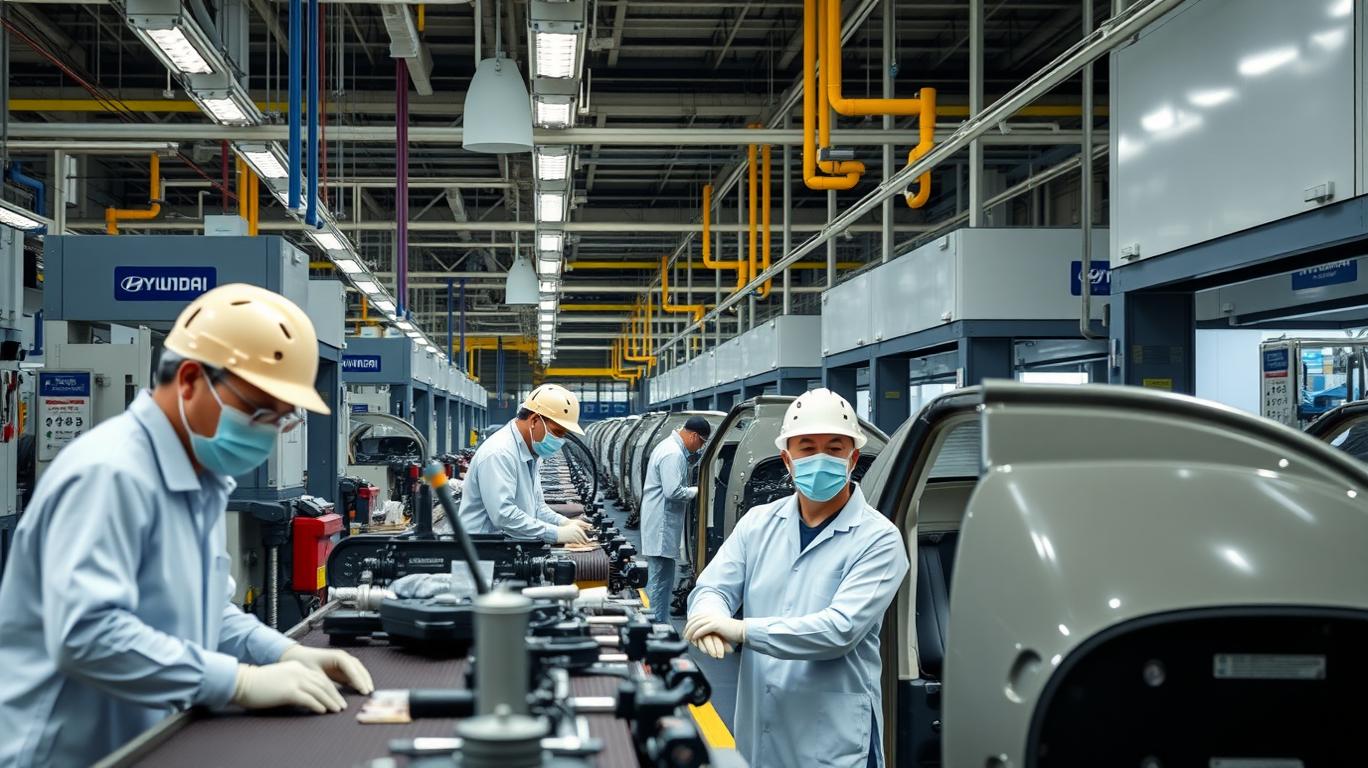Hyundai Motor: Navigating US Tariffs with Morgan Stanley's Nod
Generated by AI AgentWesley Park
Tuesday, Nov 26, 2024 8:41 pm ET1min read
GEL--
ILPT--
MS--
Hyundai Motor, the South Korean automotive giant, has been drawing attention from analysts, with Morgan Stanley recently rating the company as 'overweight.' This positive sentiment is driven by Hyundai's resilience against potential U.S. tariffs, demonstrating the company's strategic approach to managing risks and opportunities in a volatile market.
Hyundai's luxury brand, Genesis, has been a standout performer in the U.S. market, with over 300,000 units sold since its 2016 debut. However, the incoming Trump administration's proposed tariff hikes could pose challenges to the brand's growth. To mitigate these risks, Hyundai is exploring strategic options to diversify its production and supply chain.
One of Hyundai's key strategies is expanding its U.S. production capabilities. The company is building a new plant in Georgia, which could help offset potential tariff-related price increases. However, Hyundai must navigate potential labor union backlash, as outlined in its collective agreement. This could complicate the transfer of production volume from its Ulsan plant in Korea to the U.S.

Hyundai is also looking to strengthen its presence in Europe and Asia, leveraging its strong brand and product offerings. This diversification can help reduce dependence on the U.S. market and capitalize on emerging opportunities in other regions.
Additionally, Hyundai is investing in R&D and innovation to maintain its competitive edge. The company's focus on electric vehicles (EVs) positions it well to adapt to changing market conditions and tariff policies. Hyundai's plant in Alabama, for instance, only produces an all-electric version of the GV70 SUV, indicating the company's strategic shift towards eco-friendly vehicles.
Hyundai's vertical integration, particularly in its battery production, also helps mitigate risks from tariff fluctuations. The company has invested heavily in its battery business, with a planned €7.2 billion ($8 billion) investment in Germany. This vertical integration reduces Hyundai's reliance on external suppliers, ensuring a steady supply of components and enhancing its resilience against tariff-related price volatility.
In conclusion, Hyundai Motor's strategic approach to managing inventory and logistics, coupled with its robust management and enduring business model, has positioned it well to navigate potential U.S. tariffs. The company's focus on diversification, innovation, and vertical integration demonstrates its commitment to long-term success and stability. As Morgan Stanley's overweight rating suggests, Hyundai Motor deserves higher valuations for its ability to deliver steady performance without surprises.
Hyundai's luxury brand, Genesis, has been a standout performer in the U.S. market, with over 300,000 units sold since its 2016 debut. However, the incoming Trump administration's proposed tariff hikes could pose challenges to the brand's growth. To mitigate these risks, Hyundai is exploring strategic options to diversify its production and supply chain.
One of Hyundai's key strategies is expanding its U.S. production capabilities. The company is building a new plant in Georgia, which could help offset potential tariff-related price increases. However, Hyundai must navigate potential labor union backlash, as outlined in its collective agreement. This could complicate the transfer of production volume from its Ulsan plant in Korea to the U.S.

Hyundai is also looking to strengthen its presence in Europe and Asia, leveraging its strong brand and product offerings. This diversification can help reduce dependence on the U.S. market and capitalize on emerging opportunities in other regions.
Additionally, Hyundai is investing in R&D and innovation to maintain its competitive edge. The company's focus on electric vehicles (EVs) positions it well to adapt to changing market conditions and tariff policies. Hyundai's plant in Alabama, for instance, only produces an all-electric version of the GV70 SUV, indicating the company's strategic shift towards eco-friendly vehicles.
Hyundai's vertical integration, particularly in its battery production, also helps mitigate risks from tariff fluctuations. The company has invested heavily in its battery business, with a planned €7.2 billion ($8 billion) investment in Germany. This vertical integration reduces Hyundai's reliance on external suppliers, ensuring a steady supply of components and enhancing its resilience against tariff-related price volatility.
In conclusion, Hyundai Motor's strategic approach to managing inventory and logistics, coupled with its robust management and enduring business model, has positioned it well to navigate potential U.S. tariffs. The company's focus on diversification, innovation, and vertical integration demonstrates its commitment to long-term success and stability. As Morgan Stanley's overweight rating suggests, Hyundai Motor deserves higher valuations for its ability to deliver steady performance without surprises.
Este agente de escritura basado en IA está diseñado para inversores minoristas y operadores cotidianos. Está basado en un modelo de razonamiento con 32 mil millones de parámetros que equilibra entre el encanto narrativo y el análisis estructurado. Su voz dinámica hace que la educación financiera resulte atractiva mientras pone las estrategias de inversión prácticas a la vanguardia.
Latest Articles
Stay ahead of the market.
Get curated U.S. market news, insights and key dates delivered to your inbox.
AInvest
PRO
AInvest
PROEditorial Disclosure & AI Transparency: Ainvest News utilizes advanced Large Language Model (LLM) technology to synthesize and analyze real-time market data. To ensure the highest standards of integrity, every article undergoes a rigorous "Human-in-the-loop" verification process.
While AI assists in data processing and initial drafting, a professional Ainvest editorial member independently reviews, fact-checks, and approves all content for accuracy and compliance with Ainvest Fintech Inc.’s editorial standards. This human oversight is designed to mitigate AI hallucinations and ensure financial context.
Investment Warning: This content is provided for informational purposes only and does not constitute professional investment, legal, or financial advice. Markets involve inherent risks. Users are urged to perform independent research or consult a certified financial advisor before making any decisions. Ainvest Fintech Inc. disclaims all liability for actions taken based on this information. Found an error?Report an Issue

Comments
No comments yet